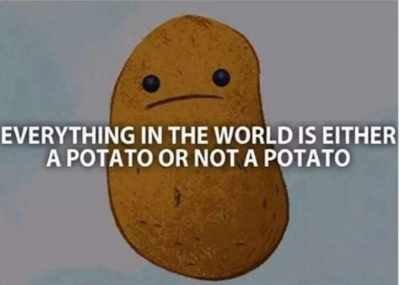What Do You Call a Potato Who Reads the News? Within the tremendous scene of comedy, pleasantry holds an uncommon put. Plays on words, with their intelligent turns on dialect, regularly make us chuckle, moan, or indeed think.
what do you call a potato who reads the news:
One delightful illustration is the address:
“What do you call a potato who peruses the news?”
The answer, a “commentator,” may be an idealised mix of humour and phonetic mind. But past the quick chuckle, this play on words opens up an interesting discussion approximately dialect, humour, and indeed the social noteworthiness of potatoes. Let’s jump profound into the layers of this straightforward joke.
The Anatomy of a Pun:
To completely appreciate the joke, it’s basic to get what makes a quip work. Plays on words are a frame of wit that misuses different implications of a term or similar-sounding words for an aiming funny or explanatory impact.
In this case, “commentator” sounds like a “common tater,” cleverly consolidating the picture of a potato with the part of a newsreader.
The humour in plays on words frequently comes from the shock and enchantment of recognizing the double meaning.
Our brains appreciate the mental tumbling of exchanging between diverse elucidations of the same sound or state.
This specific quip is successful since it consistently mixes a regular object—a potato—with a commonplace concept—a commentator. The foolishness of envisioning a potato conveying news includes an additional layer of humour.
Potatoes in Well-known Culture:
The potato, a humble tuber, has been a staple in diets around the world for centuries. Its social noteworthiness changes from locale to locale, but it has reliably been an image of food and effortlessness.
Potatoes have moreover found their way into the prevalent culture, regularly as images of conventionality or unwavering quality.
In literature and media, potatoes sometimes represent the everyman. They are dependable, unpretentious, and universally recognized.
This universality makes them ideal subjects for humour. When we anthropomorphize a potato, giving it human traits or roles, it immediately becomes funny because it subverts our expectations. A potato reading the news is absurd precisely because it’s so unexpected.

The Role of Commentators:
Commentators play a vital part in media. They analyze, translate, and display news and occasions to the open.
Their bits of knowledge offer assistance to gatherings of people to get complex issues and frame conclusions.
The term “commentator” comes from the Latin “commentari,” meaning “to examine or interpret.” It’s a part that requires information, persuasiveness, and regularly a certain gravitas.
Juxtaposing this serious role with a potato, an object associated with simplicity and ordinariness, creates a humorous contrast.
The idea of a “common tater” providing commentary is funny because it undermines the seriousness typically associated with news readers. It’s an effective use of irony, highlighting the gap between the expected and the actual.
The Psychology of Humor – Potato Who Reads the News:
Humour may be a complex mental wonder. It frequently emerges from the ambiguity between what we anticipate and what really happens.
Quips, in particular, play with phonetic desires. Our brains are wired to recognize designs and make associations, so when a play on words powers us to reinterpret a recognizable word or express it, it makes a minute of cognitive disharmony that we discover interesting.
The “commentator” quip works on numerous levels. On one level, it’s a straightforward play on words. On another, it’s a clever subversion of roles. By attributing a sophisticated task to a humble object, it creates a surprising and amusing incongruity.
Puns in Everyday Life:
Quips just like the “commentator” joke are more than fair basic pleasantry; they reflect the lively nature of human language.
We always control dialect to specify ourselves, make others giggle, and interface with those around us. Quips are a confirmation of the flexibility and inventiveness inalienable in human communication.
In daily life, quips can serve as icebreakers, discussion starters, or a way to infuse a bit of humour into unremarkable circumstances.
They are open to individuals of all ages and foundations, making them an all-inclusive shape of comedy. The effortlessness of quips, combined with their potential for cleverness, makes them an adored perspective of humour.
The Social Noteworthiness of Pleasantry:
Diverse societies have diverse connections with wit. In English-speaking societies, plays on words are an unmistakable include of humour.
They are found in writing, promoting, and ordinary discussion. Shakespeare, for occurrence, was an ace of plays on words, utilizing them to include layers of meaning and humour in his plays.
In other societies, pleasantry can take diverse shapes. Japanese humour, for instance, often includes “dajare,” which are puns that play on the phonetic similarities between words.
Despite the variations, the enjoyment of wordplay is a common thread across cultures. It speaks to the universal human delight in language and its possibilities.
The Evolution of Humor:
Humour advances in society. What was clever a hundred a long time ago might not be as interesting nowadays, and bad habit versa.
Be that as it may, plays on words have an ageless quality. They depend on the structure and sound of dialect, which doesn’t alter as quickly as social standards or comedic tastes. This makes plays on words just like the “commentator” joke enduringly clever.
Within the advanced age, humor spreads rapidly through social media and other online stages.
Plays on words and other shapes of wit are frequently shared as memes, coming to tremendous gatherings of people in a brief time.
With its effortlessness and cleverness, the “commentator” play on words could be a culmination illustration of the kind of humor that flourishes in this environment.
conclusion – Potato Who Reads the News:
The Persevering Offer of the Potato Quip:
“What do you call a potato who peruses the news?” The reply, a “commentator,” is more than fair a joke. It’s a celebration of dialect and humour.
This pun combines the conventional with the exceptional, the basic with the modern, making a delightful shock that makes us giggle and think.
All you should know about: Claudia Sheinbaum and Mexico Election 2024
The offer of this joke lies in its cleverness and the inclusiveness of its components. Potatoes are a common part of our lives, and the role of a commentator is familiar to us all.
By bringing these two together in an unexpected way, the pun highlights the playful nature of language and the joy of humor.
Within the conclusion, quips like this one remind us of the imaginative potential in ordinary words and ideas.
They show us that humor can be found within the least complex of places, indeed in a potato perusing the news.
So, the other time you appreciate a great play on words, take a minute to appreciate the layers of thought and mind that go into making such an apparently straightforward joke so magnificently engaging. Don’t forget to follow us on Facebook.

























